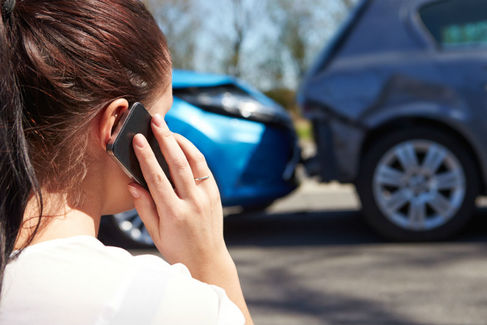Auto Accident—What Should I do now?

The average person is involved in a car accident every 7 years. It is important to know the proper steps to both expedite passing of your unpleasant experience and minimize the financial impact. It is best to have a general idea of what to do both at the scene of the accident and in the aftermath.
At the Accident Scene:
- Stop immediately but do not obstruct traffic. Be careful to not expose yourself to further injury.
- ASK if the other person is okay. (It is NOT a good idea to say “I’m sorry.” It CAN be perceived as an admission of fault.)
- Assist any injured person—call 911.
- Record the names, phone numbers, addresses of other drivers, witnesses, and injured persons EVEN IF THE POLICE OFFICER IS DOING THE SAME. This information is not always properly transferred to a police report and may become vital later.
- Record the make, model, and license numbers of all cars involved.
- Make a rough drawing of the accident scene while your mind is fresh. Clearly show positions of cars and other details. Take pictures with your phone’s camera to capture the accident scene, the vehicle damage, the location, etc.
- Resist the urge to wash your car if you were in a collision with an animal until a claims adjuster has been able to examine it. The animal matter that remains on your car could be the difference between an “at fault collision” accident on your driving record or a less severe “comprehensive claim.”
- Remain calm, courteous, truthful, and consistent in your description of the accident.
After the Accident:
- Call your AGENT for advice, not your insurance carrier.
- Do not accept well meaning advice from the police to “call your insurance carrier” if you are NOT at fault. (Claims subrogation sounds convenient, but it costs you money in higher insurance premiums later).
- Consider your deductible and the impact on your insurance premium before you determine if you should report the claim to your insurance carrier.
- Do not immediately contact an attorney. If the insurance claim is simple, uncomplicated, and straightforward based on the police report and witness statements, an attorney’s involvement will significantly delay the processing of your insurance claim.
The Bottom Line:
- Your insurance agent is your best resource. He or she will have contacts to the best repair shops and will know your insurance carrier’s process for filing a claim as well as if that is in your best interest.
- Treat your attending officer with utmost respect, but realize that he or she (while with best intentions and very professional) is not a licensed insurance agent. You may be advised to turn things in to your insurance for convenience or to give a tow truck driver your insurance information. The officer may also insist on exchanging your insurance information with the other driver on the police report. If you know that the accident is not your fault, politely request that this “standard practice” be waived so that no false claims are reported to your insurance company.
Be the FIRST to get your statement in to the insurance company. If the other driver is at fault, call their carrier directly and tell your story. Offer the supporting evidence you collected to the claims adjuster. If you were at fault, (after calling your agent) call your carrier’s claims department immediately and report the accident.

Add new comment